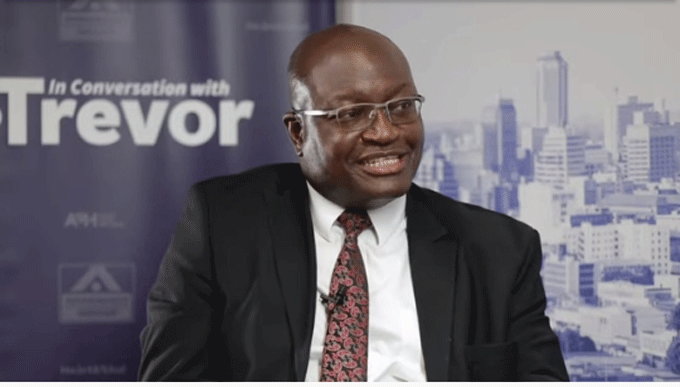
Price-Waterhouse Coopers (PWC) managing partner for Zimbabwe and Malawi Tinashe Rwodzi has spoken of how he navigated disruptions to his education during the war to achieve his dreams.
Rwodzi (TR) told Alpha Media Holdings chairman Trevor Ncube on the platform In Conversation with Trevor that at one point he had to go on hunger strike to persuade his father to allow him to return to school.
Below are excerpts from the interview.
TN: Tinashe Ignatius Rwodzi, welcome to In Conversation With Trevor.
TR: Trevor, thank you very much.
It is an absolute pleasure and honour for you to have me here. I feel so privileged to be part of such a good show.
TN: Thanks Tinashe. The truth is I have been chasing you around, you are so busy running Zimbabwe and Malawi as the managing partner of PwC.
I do not take your time for granted, thank you so much for creating the time.
- Chamisa under fire over US$120K donation
- Mavhunga puts DeMbare into Chibuku quarterfinals
- Pension funds bet on Cabora Bassa oilfields
- Councils defy govt fire tender directive
Keep Reading
TR: Thank you Trevor, I appreciate. I must apologise to Marble (Ncube’s personal assistant), who I really gave the runaround because of my busy schedule.
TN: But we are patient, we wait until you are ready.
TR: And she is persistent.
TN: Very persistent. Tinashe, I have to start with you deciding desperately that you were going to blackmail your father when you could not go to school because of the war.
There is a theme that goes through your life, particularly the early part of it, your hunger for education.
Your education got interrupted a number of times by the war, and finally your father decided enough was enough with the changing of schools and just decided you would no longer go to school.
You then decided you would not eat until you were allowed to go back to school?
Talk to me about that.
TR: Trevor it was actually quite an interesting one, it just happened automatically.
It is not something I sat down to think about, this was after the second closure of a school, specifically St Francis of Assisi in Chivhu.
That walk from St Francis of Assisi home was about 40km on foot because the school had closed down.
I got there and of course my mother cried, my father simply said these things happen young man, and was glad I was back.
Then of course word came through that we had been organised a class at Kutama, and I said to my father, “Baba, can I please go?”
He said no way, as I had escaped the danger of war too many times by a close shave.
He said the time would come for me to go back to school, but not at that present time.
I pleaded and pleaded and it did not work.
Then I just automatically switched into not eating.
Of course, I had no concept, it was a hunger strike, I just stopped eating.
My mother got worried, told my father who simply brushed it off and said to her I would start eating soon, she should let me be.
After the third day it was clear this was now becoming serious, by the fourth day my father said it was okay I could go to school. if I wanted to die due to the dangers of the war I could go ahead and put my life at risk.
That is how it played out.
TN: Did mom support you in your hunger strike?
TR: Mom supported me fully, she was obviously terribly worried that I was not eating.
I suspect behind the scenes she was putting pressure on the old man, but my old man was a tough guy.
I actually do not know how he actually relented to that and said I could go.
TN: Tell me, how tough was he?
TR: He was the kind of tough guy who took no nonsense. I will give you just two examples.
For the boys, the sun would not rise whilst we were in bed.
It did not matter whether it was a Sunday or a Wednesday, a boy had to be up before sunrise and see how things are arranged.
Secondly, for the boys, you had to go and work hard, there was no nonsense of being tired, etcetera.
If you came through for instance, and it was that there was some mischief at school and the headmaster required the presence of your father, my father would simply ask why he was wasting his time and energy.
He would say one could come and work for him!
TN: You and I do not do that with our sons anymore, Tinashe?
TR: No, we do not.
TN: We are spoiling them, we are breaking them aren’t we?
TR: If we did that Trevor, what would they call it?
TN: Abuse.
TR: Child abuse.
TN: But look at how you turned out?
TR: That toughening yes.
Incidentally I was having conversations with my kids, and I said to them I could never treat them the way my father treated me, but as a result I am able to handle things much better in terms of tough things than them.
We just do not treat our kids that way.
TN: We do not. How was mom? Was she a tough woman?
The one that softened things behind the scenes for you to get away with ‘murder’?
TR: Fortunately, she is still around, and I am very blessed to still have her.
She is the apple of my eye. I know we normally say that about our daughters, but I say that about mom.
TN: How old is she now?
TR: She is 86 years old.
TN: Fantastic.
TR: Mum was very supportive, but in her support, she had a firmness, that said yes your father was tough on us, but he was right.
Tell you one simple incident.
We all grew up herding cattle, so I would go herding cattle, and of course they go astray into a neighbour’s field from time to time.
Come back home in the evening, and the old man says come for a beating, and I would duly walk to him to get a beating.
As he is beating me, mom comes and pulls me away saying how can I just stand there and be beaten.
Afterwards she would say you did not do things right and dad had the right to beat you up, but she just felt perhaps dad had gone too far with the beating.
TN: That’s amazing. You say two schools had been closed?
Is that it? Just explain to us that experience of a school being shut down because of the war? Exchange of gunfire? What that did to you and your education.
TR: Trevor, the first to be closed was Mount St Mary’s, or Rusunzwe as they call it in Wedza.
So we had just opened for Form Three, and yes the freedom fighters used to come to the school.
We knew some of them by name, and of course as you know then they stopped the community from doing things like dipping cattle just so to break the system.
The school was on high ground, you would go into the valley, up and across the valley was the dip tank.
You could see the dip tank from the school.
The Rhodesian Army came and ordered the community to bring their cattle for dipping.
Of course, the Rhodesian Army (RA) was there, the opposing freedom fighters saw this as a good target.
So the RA was there waiting for people to bring their cattle.
So naturally the firing of guns started, and of course it went on and even spilled into the schoolyard.
The eventual outcome was that we had to close the school.
So we quickly packed our trunks, as they were then, we never took suitcases to school!
TN: The metal trunks!
TR: Packed up, locked up and took our keys and we ran. So we literally just left everything there.
TN: That was the first school to close?
TR: Yes, the first one. So we went back home and because it was a Roman Catholic school and because of the network of the Catholic schools we were then offered a class at St Francis of Assisi School in Chivhu.
We went there and finished off Form Three.
Just as we had opened for Form 4, there was a lone guerilla, I think some people may have heard of him, Simukai Timapedze.
He was operating in that area, and firstly he wanted to recruit us to go to Mozambique.
The first group went and got into the war before we left, then they decided to close the school.
That was then the second school to be closed.
We had to journey home again.
Then came my blackmailing of my father, as you put it.
Word then came that Kutama was offering us a class.
As we got to Harare on our way to Kutama, it closed.
So we then wondered what we would do.
We then formed a group with some friends and we went to a place called Batsiranai College in Highfield in Western Triangle.
We tried to get a class and it did not work.
We formed our own study group, looked for our own teachers from Assisi and Mount St Mary’s, and we got going.
Of course, it was not formalised, it was not recognised and it did not work.
Then we decided to approach the headmaster of St Mary’s in Chitungwiza who kindly offered us a class.
Of course we quickly filled it up and that is where I did second and third term Form 4, and that is where I wrote my O’ Levels.
TN: This hunger for education? Where was it coming from?
Had you seen what education had done for other people?
Where did the inspiration come from? Wanting education so much and going out of your way to get them education, you and your friends?
TR: Born in a rural setting Trevor, and growing up in a rural setting, and looking at inspiring figures who had done things back then was teaching and nursing.
Seeing how they had changed their lives, to me it was the only gateway out of my subsistence farming rural setting.
Therefore, I was determined that I would make it and that was my way out.
TN: You know it is interesting because it reminded me, as I was going through your story, of my own life in the township in Magwegwe where what we would do during the school holidays is to go to the nearest school and ask the headmaster to give us a class to be able to study.
Due to the fact you would have seen some people around you being successful, but more importantly, the poverty that we were dealing with at home said to you unless you did something you would be stuck there!
TR: You had to do something meaningful and big to get out of there and also carry one’s family out of that.
- “In Conversation With Trevor” is a weekly show broadcast on YouTube.com//InConversationWithTrevor. Please get your free YouTube subscription to this channel. The conversations are sponsored by Nyaradzo Group.










